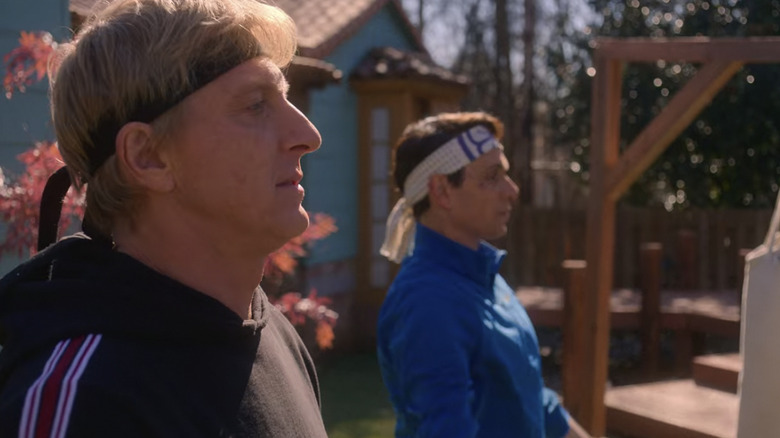
I grew up watching the "Karate Kid" trilogy, so those movies have always held a special place in my heart. My dad used to quote Mr. Miyagi to me and my older brother, whether it was a smirking "wax on, wax off" or "beginner's luck!" with a scoff, or something more profound like "Never put passion in front of principle — even if you win, you lose," "No such thing as bad student, only bad teacher," or "When you feel life out of focus, always return to basic of life — breathing."
The man was endlessly quotable for a reason — he was the heart and soul of the franchise.
So how does "Cobra Kai" manage to maintain that same heart without the iconic character immortalized by Pat Morita? The answer is simple: through music.
Bill Conti's score for the first three films became truly iconic, especially when his original compositions were paired with gems like Joe "Bean" Esposito's "You're The Best," Peter Cetera's "The Glory of Love," or Commuter's "Young Hearts." On top of the soundtrack, each character had their own unique theme that influenced so much of the story. Music became as integral a character as Mr. Miyagi or Daniel LaRusso, and that's something "Cobra Kai" composers Zach Robinson and Leo Birenberg have understood since day one.
I had the pleasure of speaking with Birenberg and Robinson about their work on the series, honoring Conti's original sound, and breathing new life into nostalgic places. We collectively geeked out over certain scenes from "Cobra Kai" season 4 (you know exactly which ones), talked about Terry Silver's compelling Bad Guy™ vibes, and whether it's more compelling to compose deep emotional moments or a powerful villain score.
It's safe to say that they're the best around, and nothing's gonna ever keep them down.
This interview has been lightly edited for clarity and brevity. Spoilers for "Cobra Kai" season 4 ahead.
'How Are We Going To Evolve Terry's Character In 2022, And What Does That Modern Palette Sound Like?'
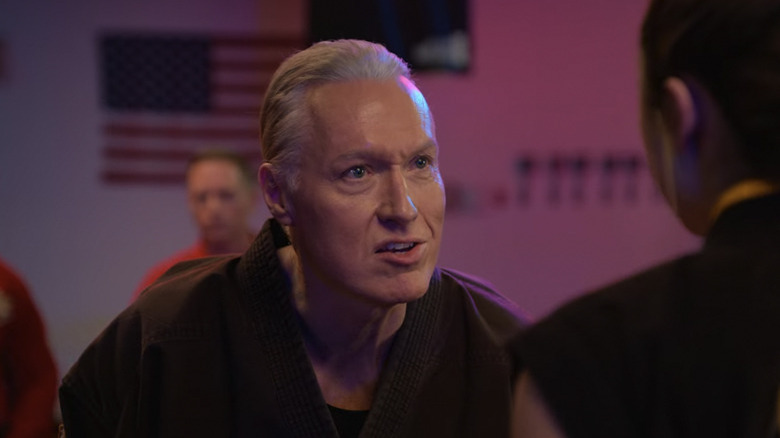
The "Karate Kid" movies are heavily influenced by their soundtracks and scores. Through each installment, the score offers a really clear delineation between each character. It feels like you brought a lot of that into the show as a whole, especially this season.
Robinson: I think so.
Birenberg: I think that's a fair assumption. Have you seen season 4?
Yep.
Robinson: Great.
So, what was that like? Because in the first two seasons, you got a bit more of that original "Karate Kid" vibe with the hair metal. Then in the previous season, when we went to Okinawa, you guys brought more influence from the second film. And now that we have Terry Silver (Thomas Ian Griffith), you got to experiment with classical. What was that process like?
Birenberg: Before answering that specifically, every season, we're always looking for new opportunities to expand our palette from where it started in season 1. Which, as you said, is very hair metal-influenced and was a little more through Johnny's blend, at least at the start of the season. Then it kind of expanded to encompass some of those more mystical sounds of Miyagi-Do, and that kind of took us through season 2. And in season 3, we had Okinawa. We had Vietnam. Every time one of these new doors opens, we're always trying to find the best way to write a musical love letter. Like the '80s movie score genre using "Karate Kid" is kind of the entrance point, but going in different directions from there. So season 4 I think gave us the same opportunity.
One of the biggest changes in season 4 is Terry Silver coming back, who is in a lot of ways one of the most infamous, bad '80s villains of movie lore. I feel like his screen presence is just kind of legendary. As most things are with "Cobra Kai," they tend to turn these characters on their heads and interpret them in shades of gray. So there is this starting sound from ["The Karate Kid Part III"] that is very classical. And we kind of had to decide, how are we going to reinterpret that palette? And then how are we going to evolve Terry's character in 2022, and what does that modern palette sound like?
Am I wrong in thinking that there's a little Vivaldi in there with Terry Silver's theme? Is that kind of an influence?
Birenberg: Yeah, think they definitely used -- I'm not sure if it's actually Vivaldi.
Robinson: No, it's [Bill] Conti, but then there's Paganini too, right?
Yeah.
Robinson: Oh, he plays Paganini [on the piano], which was in the script, and then Conti's direction for a "Karate Kid III" was ... I don't know this for sure, but it was obviously Vivaldi and it is that kind of stereotypical -- well, stereotypical to us now, maybe not as much back then -- but the bad guy listens to classical music, the high society snob just listens to Vivaldi 24/7 on his HiFi or whatever. But, yeah, I mean, Leo said it. You said it perfectly.
Birenberg: Well, maybe we should talk a bit about where we took to the Terry music, because we did a lot of the classical music that was in the script. Some of the callbacks to the "Karate Kid III" score did some of the heavy lifting in terms of establishing who Terry Silver was, his old persona, but we kind of turned it into a ... I don't know. Zach, what genre would you say?
Robinson: Well, part of it was that we knew that we wanted to take the classical influence because that is Terry's sound, that has been established. But with everything on this show, how do we spin it? So the first scene, we knew we wanted to have our own Terry theme, which we are allowed to do in this series. Sometimes we use some Conti stuff, but all these characters have their own themes, so Terry was no exception. The first time Terry comes into the dojo in episode 3 with Kreese, that's the first time you hear Terry's new theme. You actually hear it on slow strings, but then you hear it on guitar.
That's kind of where the "Cobra Kai" comes in, and we have a lot more to kind of say about Terry musically. And I know the show has a lot more to say about Terry and his story, so we haven't fully unleashed the Terry Silver sound. This was like a prelude to what we imagine being the ultimate Terry sound. But we added electric guitars. We had it incorporated with the orchestra more, and we had other classical forms --
Birenberg: Very functional harmony. But there's also ... Thomas Ian Griffith has this seemingly insane screen presence. He just dominates every scene he's in, which I think people are going to find -- they're just going to have to re-watch the season over and over, because it's literally addicting watching him perform. He's this infamous villain. So I feel like, in creating his modern palette, we were trying to tap into this --
Robinson: The '80s villain.
Birenberg: The '80s villain. There's a couple scenes [that are] really tastefully over the top, and we just had a lot of fun with him
'Musically, It Is Such A Playground For Us To Really Take It To The Next Level'
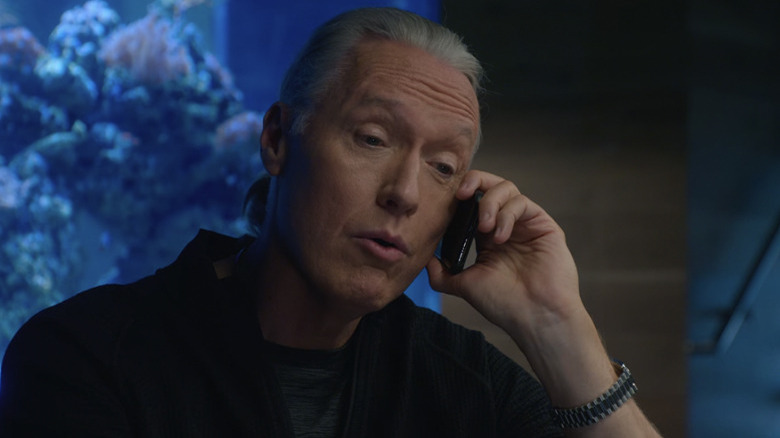
I mean, he's pretty insidious when you first meet him [in "The Karate Kid Part III"].
Birenberg: Oh yeah.
Kreese is iconic in his own way. Everybody knows him, but not everybody is as familiar with Terry Silver. He's absolutely insane. So the idea of taking him and starting from this kind of nuanced restrained persona, and then being able to unleash him, must have been exciting for you guys.
Robinson: Absolutely. The stakes are so much higher when Terry is involved. There's more violence. He commits illegal acts of violence on people in this season. And there's manipulation, but also he's devious and his whole kind of like David Fincher-esque plan that gets rolled out at the end of the last episode. Everything that's happening now has really been like ... this isn't just about karate anymore, in a way. [Terry] even represents that in the movie. So yeah, musically, it is such a playground for us to really take it to the next level.
We have said this before, but we can never go big enough on this show. We are always, always taking it as big as we think we can get, and we always find ways to get bigger. But ["Cobra Kai" showrunners] Jon [Hurwitz], Josh [Heald], and Hayden [Schlossberg], every time we go big, we think they're going to tell us to take it down a notch and they never do. Because the show at this point, especially the scope, is just so big. So like scoring Terry Silver. One of our favorite scenes, for some reason, was ... [Speaking to Leo Birenberg] You know what I want to say? The scene when Terry Silver is talking to Johnny in episode 8 and he's on the phone and he's sitting in front of a giant fish tank and it's like -–
Birenberg: I knew you were going to say that.
Robinson: Yeah, well, I know that Hayden specifically loved this shot and everything. We saw that image of him just sitting in his like '80s bad guy lair with his fish tank. We were like, "How do we score this scene as big and evil as possible?" We did it, and it's in there, and that's how scoring this show goes. It's such a blast.
I admittedly resisted watching "Cobra Kai" for a long time because I thought, "Why would I want to watch a show where Johnny's not the villain? I don't understand. This is insane." Then, of course, it makes its point, and everything makes sense, and it's incredible, and I love it. But how do you walk that fine line between incorporating something that has a very specific fan base and is very near and dear to people's hearts while not making it a caricature of itself and still allowing it to be big?
Birenberg: I think what the showrunners, Jon, Josh, and Hayden identified about the "Karate Kid" cinematic universe that literally nobody else had identified was that the reason those movies work is they tap into these universal underdog stories that you find across giant franchises in cinema. So the movies actually have the potential for a lot more appeal than I think the random studio exec in 2017 might have thought. They, as huge fans of this property, dropped it off and said, "Here's a story. This story is unfinished and it is leaving so much to be told, and we can tell this." These characters are so rich, and basically, they started writing this thing and it just came pouring out and it is so natural — the evolution of every character and the emotional complications of it and the unfinished threads of the tapestry.
We've told this story about when we were in one of our first meetings with the guys. Jon looked at us across the table and he says, "Guys, you need to understand this is my 'Star Wars.'" And we had never thought to make that comparison. Yeah, "Star Wars" is, like, the biggest thing ever, and "Karate Kid" is "Karate Kid." But once you kind of envelope yourself in their world and buy into the story, which is so easy, because it's so compelling, you realize that, as Zach was saying in terms of the scope, the scope is massive and pretty much anyone who will sit down and watch it will buy into that once they start watching it. So we've just found this wealth of opportunity for storytelling through music, and it comes so naturally with the material.
'I Almost Peed My Pants At That Reveal'
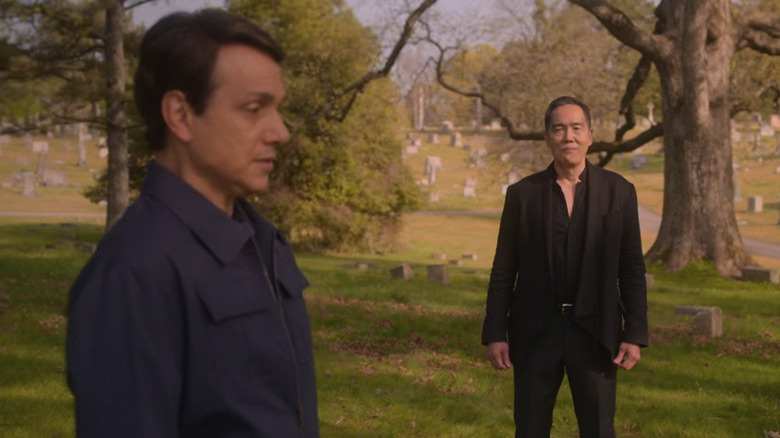
I'm pretty sure I know the answer to this, but would you say it's more fun for you to score the more emotional moments like near the end of the season with Johnny and Robbie? Or is it more fun to bring out the full insidiousness of Terry Silver at the very end when he has his massive bad guy double cross?
Robinson: I think, as Daniel would say, it's all about balance [laughs]. I guess I'm speaking for Leo, but I think we enjoy writing all types of scenes. Because sometimes, when you do a wall-to-wall two-episode season finale of tournament action music, you get a little exhausted. But sometimes we have ... I think we have the most fun, but also the most special moments sometimes can be those emotional moments. One of our favorites is in season 3 when Daniel's reading the letter from Miyagi.
Oh my God.
Robinson: That's probably one of the high points for us and for the show.
Birenberg: Or in season 4 when ... oh man, I've got two of them. One, when Miguel is putting drunk Johnny into bed. That scene is absolutely soul-crushing, and we spent a long time massaging every bit of it to make it as soul-crushing as possible. It is based on a lot of cinematic material that you might not realize at first glance. I think what makes those themes really rewarding to score is that we've set up a really fanatic score, everyone's got themes, every dojo's got themes, every discipline of karate's got themes. Once you plant all those seeds in the right places, then when you get to these complex emotional moments, you can really let the material play with each other and you just write better music once you're so fluent in your own material.
The other really emotional thing I was going to point out, which I feel like is an awesome moment in the season finale, is before the final fight in the girls' tournament when the MC of the tournament finally gives Johnny his due as the two-time All Valley champion. And it's because Daniel tips [the MC] off, and it's just one of these moments where the orchestra swells. It might be very over the top, but it's actually paralleling a moment from the season 1 finale where Daniel gets this recognition. For us, it was a really emotional moment, and we wouldn't have been able to do that without having set up these themes for Johnny the whole time, along the way.
Oh yeah, and that is a beautiful moment. Another really amazing one — and this was the cherry on top of an already incredible episode — was when Daniel's talking to Mr. Miyagi at his grave, and then Chozen (Yuji Okumoto) is standing next to him and you realize they're teaming up. That must have been really incredible.
Birenberg: When we saw that, because we didn't read the scripts beforehand, and so we were in a meeting with the guys watching the episode and like ... Oh man, I almost peed my pants at that reveal.
Robinson: Leo screamed. Leo still talks about that.
Birenberg: It was so exciting as a cinematic moment. That reveal with Chozen is ... whew, it's good!
I was watching the screener and my husband was sitting there with me and that moment came up and I probably jumped about three feet in the air and just started clapping. I was like, "Yes, this is amazing."
Birenberg: It's so well-directed.
Robinson: It's so good.
'Every Season, We Add New Themes To Keep It Fresh'
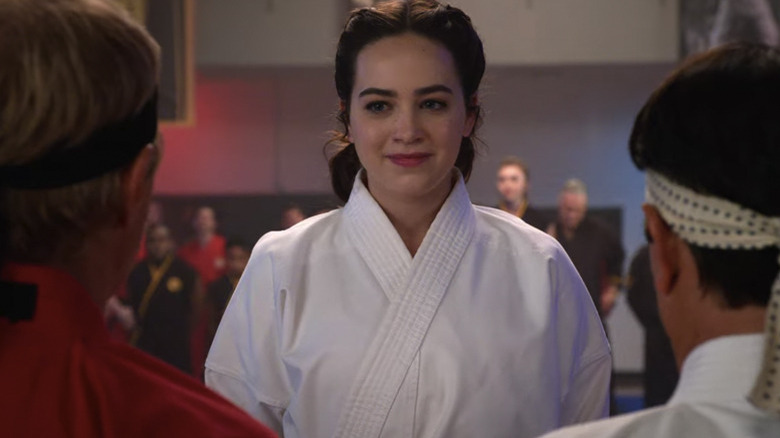
So you guys have to be fans of the properties as well, then?
Zach Robinson: Yeah, and we became bigger fans. Leo talks about this a lot, but "Karate Kid" -- we were '90s kids, so we were kind of a little past that. But "Karate Kid" was always on growing up, so we would watch it all the time, and we were very obviously very familiar with it. And then we became bigger fans as the show goes on. I watched "Karate Kid III" as we were working on season 4, and it's such an enriched experience when you're more familiar with the movies, and it's so much fun. It's really cool to be a part of this family. Undoubtedly, at least for me, I'm sure Leo too, just we are way bigger fans now. And we can't wait to see all the other things they ret-con and the other people they bring in and all that stuff. I'm working on Karate Kid-pedia all the time, looking up the folklore about the different characters.
Do you guys have a favorite character that you've gotten to score so far? A favorite theme for anyone?
Birenberg: That is always changing. And I would say, in season 4, we were very, very attached to Samantha's storyline. We just thought Sam had the best character development over the season, kind of drifting away from Daniel and buying into Johnny's teaching style, and then finding her own way to combine them and facing Tori at the tournament. By the time the season was over, we were just like, "Yep. Sam LaRusso is just the absolute biggest badass in the show. She rocks." And I think Mary Mouser just crushed the performance. And so like season 4-wise, after the Terry Silver of it all, I think Sam LaRusso is probably our highlight.
Robinson: I'll also add that every season, we add new themes to keep it fresh. And there's obviously new storylines and stuff. This year, we had kind of a tournament theme, which we were really excited about. Anytime the tournament is either happening or talked about in earlier episodes, we hint at it. And our track that we released called "It's Karate Time," is kind of like the overture featuring that theme. What's exciting about these kind of themes that we use that are season specific is you'll never know when you can use them again. But when you do use them again, it's so much fun. We loved our Okinawa theme last year and were unable to really use it this year, and I remember just being like, "Man, I really love that theme. I want to use it again," and sure enough, Chozen comes back. And we know there's going to be some Okinawa stuff next year --
Birenberg: Score-wise. Score-wise.
Robinson: We know that, "Oh, we can use that theme in other places." So it's always so much fun to just, as Leo said, plant something and then have it [come back] later.
That's really, really nice that you have been able to kind of create these really clearly delineated themes. Because that moment specifically, again, as soon as Chozen comes in and you hear the Okinawa theme slowly start to swell and it still even now gives me goosebumps. I grew up on these movies. I'm one of those people. I feel like you divide into two categories; either you think it's a total joke and you write it off, or you're way too invested in it and it's your "Star Wars."
Birenberg: Yeah.
Robinson: Yeah, yeah.
'We Had Never Really Done It Like This Before'
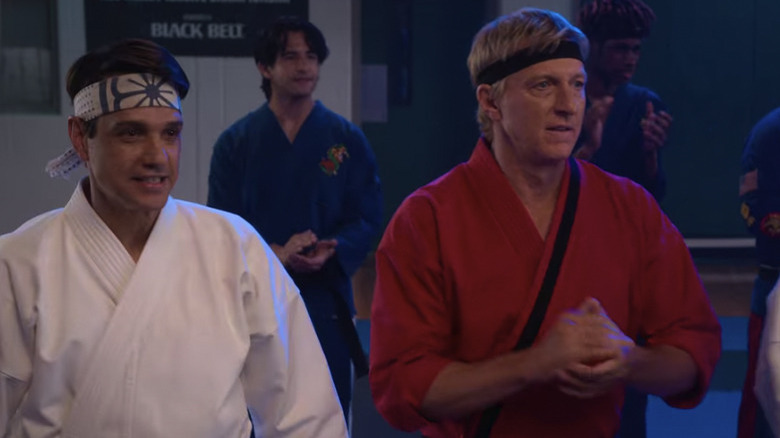
I'm sure you guys probably have a lot that you cannot say about season 5 --
Robinson: We don't know anything.
You know nothing about season 5?
Birenberg: No, we know almost nothing. Because we don't like to read the scripts ahead of time. So we have this nice routine where we will watch the episodes for the first time, for us, with the showrunners. It really informs how we're scoring. That Chozen reveal is a good example, because we want to feel what the audience is going to feel in those reveals and moments of excitement. When we're sitting down to write the score, one question we're always asking ourselves is, "Man, if we were just watching this show, what do we want here? What is the best possible thing that we could be rocking out to or emotion we could be gut punching ourselves with?" We try to always think through the lens of the audience, and I think going in "blind" really helps us establish the structure of each episode in that way.
That's fascinating. That makes a lot of sense, especially for the final impact of a lot of those moments. Is that normally how you guys work on your stuff or is that specific to this project?
Robinson: I think it changes. This project, in particular, we just are such fans of that we really do like to just watch it kind of cold and not read the scripts, for a lot of reasons. Honestly, sometimes, it's to our disadvantage only because we could start working on it a little earlier probably than we would. But then we watch the episode and it's due in a week, but we're like, "Hey, it was worth it because we got to be surprised."
Birenberg: Right. But every project has its own kind schedule and workflow, and this is just the one that seems to bring out our best work on "Cobra Kai."
I mean, clearly, it works.
Birenberg: [laughs] Thank you.
Is there anything specific about this season that you want people to take note of or that you'd like to talk about or be asked about that you haven't gotten the chance to talk about yet?
Birenberg: Zach kind of talked about this, but I think the big plot point of the season is that we are working towards the tournaments, and the last two episodes are essentially a movie that is just a karate tournament movie. For us, like we... As Zach said, we wrote a theme specific to the tournament that we kind of hinted at the full season, until it launches into that opening training montage in episode nine and reveals itself in full glory. I just think the entire idea of the tournament was very important to us, because season 1 ends with the tournament, and we haven't visited the tournament setting since then, and so much has changed with all the characters, and all the allegiances switched around. Kreese is back from the dead, and Terry Silver's also back from the dead, and there's just so much when all of the characters are in place competing in the same venue. There's just a lot to unpack. The score for those two episodes, for this tournament, was kind of our crown jewel for the season. Really, all decision making leading up to it was seen through these lens of, "When we get to the tournament, how is this going to pay off?"
Robinson: And just to add, the direction that we had for scoring the tournament was very different than the kind of direction that we've gone with on previous season finales. John, Josh, and Hayden said that even though there's another season, this is like the endgame. This is the tournament of all tournaments. They are playing for their lives. You need to score this like this is a life or death match. All these matches are life and death.
Normally we score things -- there's always kind of a wink and a nod in our scores that I think that's kind of what gives it a charm a little bit, and we're always having fun with it. Even the season 2 finale, there's a bit of fun acknowledging the fact that the entire school just broke out into a karate fight. But [now] we're here, these are the rules of the game, everyone has been waiting, they've been holding off fighting for this moment. This is where everything was going to go down. We had to score that as big and really just as deadly as possible. So when people are watching and listening, hopefully they can kind of hear the changes that we made in our tone and how we approach the score to the show. We had never really done it like this before.
"Cobra Kai" season 4 is streaming on Netflix.
Read this next: 12 Shows Like Stranger Things You Definitely Need To Stream
The post Cobra Kai Composers On The Joyous Process of Working on the Show [Interview] appeared first on /Film.
